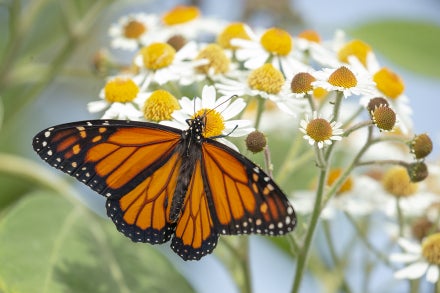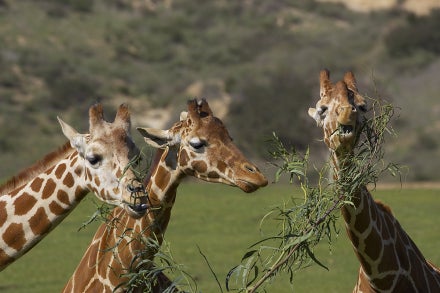
Zoo InternQuest is a seven-week career exploration program for San Diego County high school juniors and seniors. Students have the unique opportunity to meet professionals working for the San Diego Zoo, Safari Park, and Institute for Conservation Research, to learn about their jobs, and then blog about their experience online. Follow their adventures here on the Zoo’s website!
The San Diego Zoo is responsible for caring for over 4,000 animals. Every single day, the Nutritional Service Assistants prep meals for all of the wildlife. Meats, veggies, fruits, and everything in between are assembled into a menu to provide proper nutrition. Mr. Boulderson Lau, a Senior Nutritional Service Assistant, prepares these food portions; racks of ribs for the carnivores, armfuls of vegetables for the herbivores, and a variety of treats for enrichment.

Mr. Lau has been working at the Zoo for almost six years. He is an alumni of the University of Hawai‘i at Mānoa with a Zoology degree, specializing in population ecology. Being in Hawai‘i’s coastal environment inspired Mr. Lau to study coral reef biology and fish population ecology. During his time at the university, Mr. Lau was able to get a position as a laboratory technician, where he examined animals such as fish, butterflies, and crabs. After attending school and before coming to the Zoo, he worked at a fishery enforcing regulatory fishing laws. This job required the study of nutrition and feeding habits, which connected him directly to his current position at the Zoo distributing food to the animals.

Here at the San Diego Zoo, Mr. Lau holds a very important role within the Nutritional Services Department, which determines an animals’ diet. When an animal’s diet is being determined, their nutritional needs, their diet in the wild, and the foods the zoo has access to are all taken into consideration. Diet information from the Nutritionist is given to Mr. Lau so he can wash, weigh, chop, portion, and prepare food for a variety of animals throughout the Zoo. With the copious amount of specialized diets that Mr. Lau prepares, one of the most complicated diets he works on is specific to primates. Similar to humans, primates can be quite picky eaters; they’ll actually notice if the same food is being given each day. Nutritionists make sure to vary their diets from day-to-day to keep it interesting for the primates. A spreadsheet is kept documenting each animals’ diet, which depending on the animal contains a variety of fruits, vegetables, and meats, with the exact amounts. Once he has it prepared, he will hand it off to the keepers, who will feed the wildlife. His work can vary on a daily basis due to the diversity of species, each with their own unique diet.

Creative problem solving is what makes Mr. Lau’s job so enjoyable for him. Providing a diverse array of foods that is both nutritious and enjoyable to the animal is an ongoing challenge for Mr. Lau and the Nutritional Services Team. Just like humans, animals can get bored with food, so providing variety is key. Another challenge is when an animal needs to take medicine. Medicine is sometimes incorporated into food items to make it more palatable for the animals, but this can be a trial and error to determine which foods items work best. The team figured out that many animals would take a pill if it was put into something like peanut butter or Jell-O, which wasn’t part of their everyday diet. Mr. Lau is very passionate about his job, and loves when he and his co-workers put their creative minds together to figure out the best methods for preparing the healthiest diets in the most enjoyable ways for the animals. He suggests students interested in any scientific field should look for work in a lab or try to find a paid position, like working for a professor, while working towards your degree. It’s possible to gain relevant knowledge through work and you don’t always need proper schooling in a field as long as you have a solid foundation of experience.

After saying goodbye to Mr. Lau, the interns met two of the Zoo’s dromedary camels. While having the opportunity to feed them lettuce, they learned about the species’ unique physiology. Many children learn at a young age that a camel’s humps are filled with water, but they are actually made up of muscle and connective tissue. With one hump, these Arabian camels can break down up to 80 pounds of fat into water and energy when means of food and drink are unavailable. This physiological feature allows them to withstand considerably long journeys through desert terrain. In their natural habitats, dromedary camels consume desert vegetation, including thorny plants. They naturally eat only a few leaves from various plants when looking for food. At the San Diego Zoo, these camels are fed Bermuda and Sudan hay as well as herbivore pellets and lettuce.

While Mr. Lau’s job is not very hands-on with animals compared to that of a zoo veterinarian or wildlife care specialist, his role is still a valuable one at the San Diego Zoo. Mr. Lau prepares the food for each animal’s diet, a necessary job in providing for the animals’ well being. Mr. Lau’s role in conservation should not be underestimated; by caring for various species, many of which are endangered, he helps preserve populations. Although Mr. Lau works with animal diets, changes in human diets can alleviate many conservation issues. For concerned citizens, Mr. Lau recommends lowering our carbon footprint through conscious consumerism and moving towards renewable energy sources. For example, switching to a more plant based diet has been proven to substantially reduce carbon emissions. For a more direct impact on specific species such as orangutans, Mr. Lau advises purchasing sustainable palm oil products to reduce deforestation and habitat loss. Rainforest deforestation is one of the main issues facing orangutans and by eliminating unsustainable palm oil consumption, you can help solve this pressing issue.
The work being done behind the scenes is what keeps the Zoo running day after day. Nutritional Assistants like Mr. Lau are vital to each and every animal's well-being, and getting a look into such a job was definitely eye opening for all the interns. With his dedication and enthusiasm for providing all of the Zoo’s animals with diverse foods, Mr. Lau is definitely a hero for wildlife.

Week Seven
Fall Session 2020




